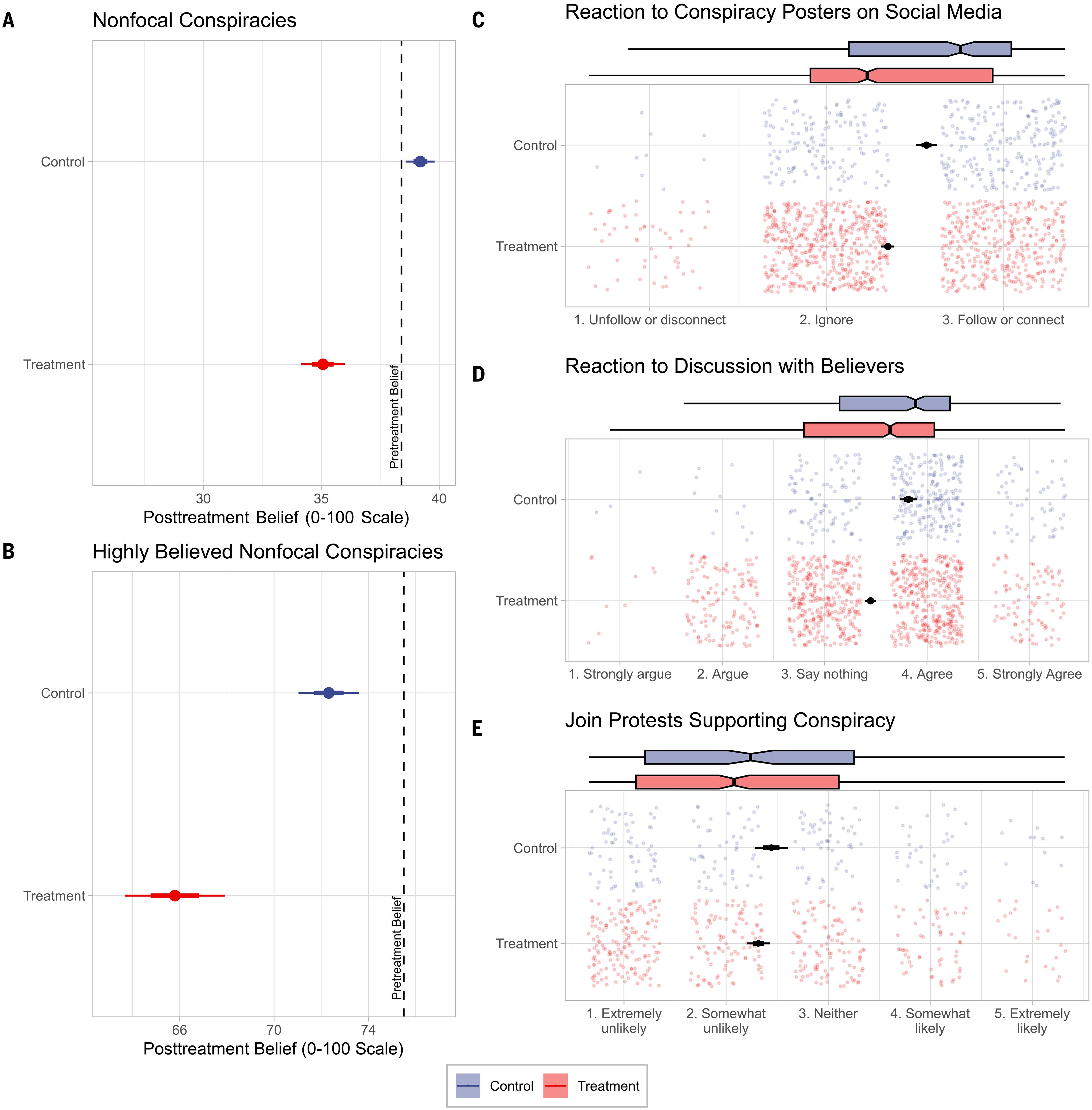Durably reducing conspiracy beliefs through dialogues with AI
IF 44.7
1区 综合性期刊
Q1 MULTIDISCIPLINARY SCIENCES
引用次数: 0
Abstract
Conspiracy theory beliefs are notoriously persistent. Influential hypotheses propose that they fulfill important psychological needs, thus resisting counterevidence. Yet previous failures in correcting conspiracy beliefs may be due to counterevidence being insufficiently compelling and tailored. To evaluate this possibility, we leveraged developments in generative artificial intelligence and engaged 2190 conspiracy believers in personalized evidence-based dialogues with GPT-4 Turbo. The intervention reduced conspiracy belief by ~20%. The effect remained 2 months later, generalized across a wide range of conspiracy theories, and occurred even among participants with deeply entrenched beliefs. Although the dialogues focused on a single conspiracy, they nonetheless diminished belief in unrelated conspiracies and shifted conspiracy-related behavioral intentions. These findings suggest that many conspiracy theory believers can revise their views if presented with sufficiently compelling evidence.

通过与人工智能对话持久减少阴谋论信念
阴谋论信念的顽固性是出了名的。有影响力的假说认为它们满足了重要的心理需求,从而抵制了反证。然而,以前在纠正阴谋论信念方面的失败可能是由于反证不够有说服力和针对性。为了评估这种可能性,我们利用生成式人工智能的发展,让 2190 名阴谋论信仰者与 GPT-4 Turbo 进行基于证据的个性化对话。干预使阴谋论信仰减少了约 20%。这种效果在 2 个月后依然存在,并在广泛的阴谋论中得到了推广,甚至在信念根深蒂固的参与者中也出现了这种效果。虽然对话集中在一个阴谋上,但它们还是降低了对不相关阴谋的信念,并改变了与阴谋相关的行为意图。这些研究结果表明,如果有足够令人信服的证据,许多阴谋论信仰者可以修正自己的观点。
本文章由计算机程序翻译,如有差异,请以英文原文为准。
求助全文
约1分钟内获得全文
求助全文
来源期刊

Science
综合性期刊-综合性期刊
CiteScore
61.10
自引率
0.90%
发文量
0
审稿时长
2.1 months
期刊介绍:
Science is a leading outlet for scientific news, commentary, and cutting-edge research. Through its print and online incarnations, Science reaches an estimated worldwide readership of more than one million. Science’s authorship is global too, and its articles consistently rank among the world's most cited research.
Science serves as a forum for discussion of important issues related to the advancement of science by publishing material on which a consensus has been reached as well as including the presentation of minority or conflicting points of view. Accordingly, all articles published in Science—including editorials, news and comment, and book reviews—are signed and reflect the individual views of the authors and not official points of view adopted by AAAS or the institutions with which the authors are affiliated.
Science seeks to publish those papers that are most influential in their fields or across fields and that will significantly advance scientific understanding. Selected papers should present novel and broadly important data, syntheses, or concepts. They should merit recognition by the wider scientific community and general public provided by publication in Science, beyond that provided by specialty journals. Science welcomes submissions from all fields of science and from any source. The editors are committed to the prompt evaluation and publication of submitted papers while upholding high standards that support reproducibility of published research. Science is published weekly; selected papers are published online ahead of print.
 求助内容:
求助内容: 应助结果提醒方式:
应助结果提醒方式:


